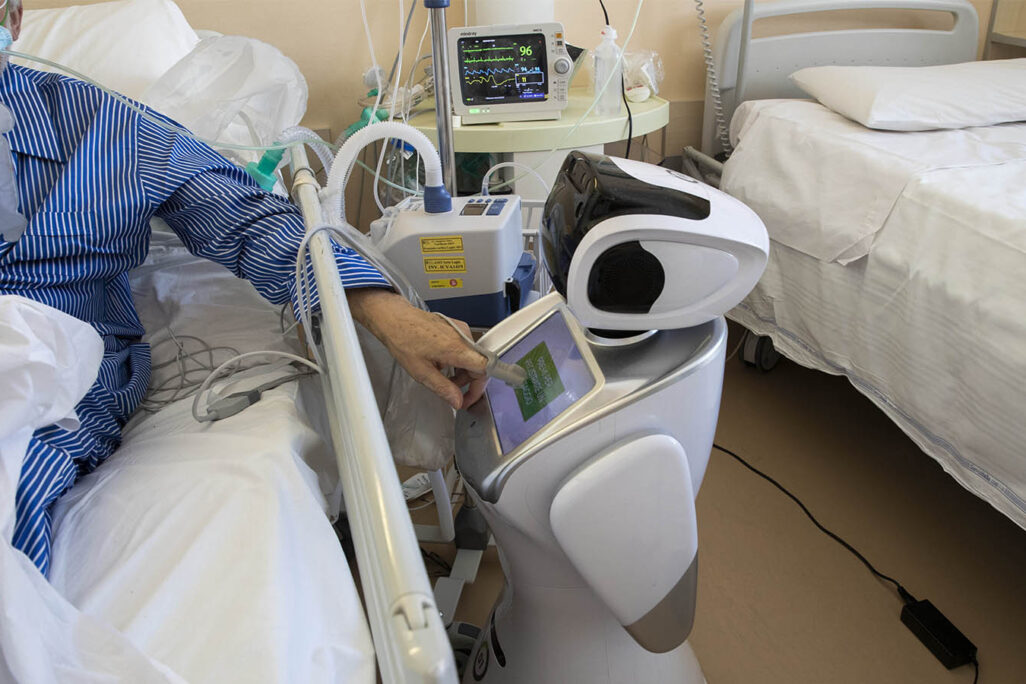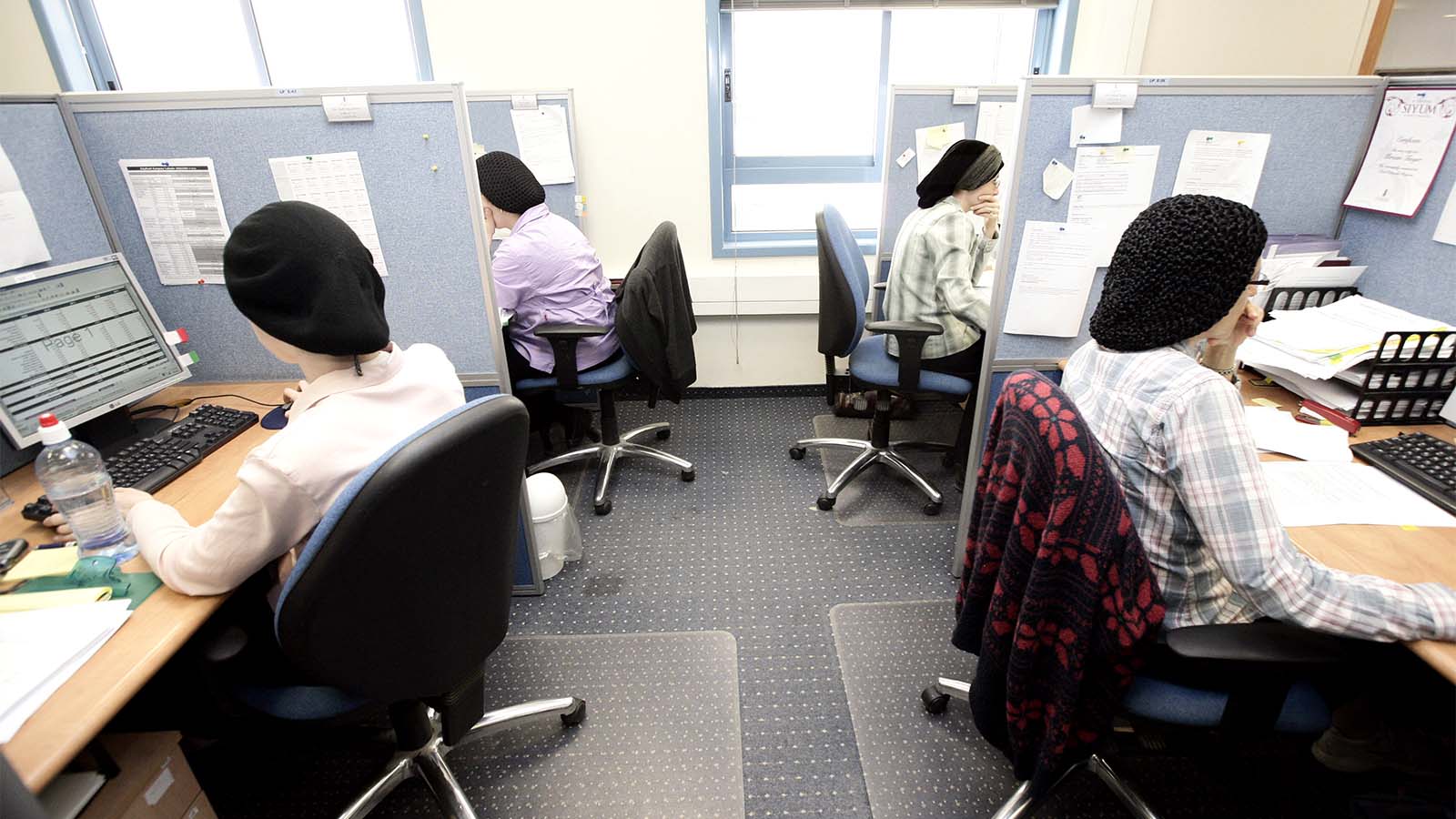
"In just one month, we’ve seen processes happen in the world of work that were supposed to take place over a decade," states Prof. Guy Mundlak, head of the Department of Labor Studies at Tel Aviv University. In an exclusive interview with Davar on the state of the labor market, Mundlak explains how the crisis meets prevailing theories and ideas, the failures of the Israeli government’s attempt to deal with the crisis, and possible ways forward.

Can you give an example of these accelerated processes?
"If a year ago we predicted that we’d see more automation and robotics in the future, we’ve now seen that within a month there are whole departments in hospitals that are operated by both a person and robots, which represents a shift in the percentage of what we call the man-machine division of labor. Reports that came out before the pandemic estimated that employers would prefer to replace workers, who have rights, to machines, who have none. In this case, the catalyst is the medical necessity of isolation and social distancing, which has created an opening for employers to replace workers with machines at an accelerated rate."
What else?
"We speak to each other on Zoom, teach on Zoom, hold work meetings on Zoom. Two months ago, we were wondering if these tools could address climate change. Getting workers to work from home, a day a week, will take off maybe 15 percent of traffic. Then, employers said, 'you can't do proper work from home.' But now everyone is doing it, and it has nothing to do with the climate crisis. It doesn’t mean that in a year, everyone will still work from home, but it does mean that everyone has already gained experience working away from the office. In a year, we will come to this discussion from a different position. "
Freelancers. Self employed. Who's responsible for them?
Mundlak also refers to the impact of the crisis on freelancers, self employed, small business owners. A group of workers who he says are harbingers of profound changes to come in the world of work.

"One of the changes that are being talked about a lot is the disintegration of permanent and stable jobs and the formation of new job configurations that go beyond the employee-employer model. Once we were sold the story that fitness instructors, beauticians, occupational therapists, etc., all love and enjoy being independent contractors, but suddenly it turns out no one is responsible for them. We won’t move forward if it’s just those types of workers who realize that they are being exploited, since employers know they can take advantage of all kinds of precarious workers. The social gaps will only widen."
"The question is whether the state recognizes the extent to which these patterns can also create social burdens and not just business opportunities. Suddenly this idea that the entire welfare state and social security mechanism can only be based on the model of an employee employed by a single employer, is being shattered. Now, the question is, who will take responsibility for these people?"
The state is back on the field
Another phenomenon that Mundlak emphasizes is the public discourse on the return of the government to the labor field, a discourse which began even before the crisis and has since gained a new urgency. "All the reports about the future of the world of work," he says, "stress the importance of the state returning to the playing field. We’re talking about labor in the future, where maybe not everyone will have a job, and definitely not everyone will have stable jobs. And here we already see it happening – unemployment has jumped from 3.5 percent to 25 percent , not twenty years in the future but here and now."
"There is no escape, and the state must step in and create a social security system – otherwise, society will not be able to function. The state cannot survive, politically or economically, if 25 percent of people survive off of their unemployment benefits, which in Israel are the lowest in the OECD [Organisation for Economic Co-operation and Development]."
Guaranteed basic income
Guaranteed basic income is an idea that, given the crisis, has become a real option on the table: "Estimations suggest that automation will replace between 15 percent and 60 percent of employees. The solution must be some kind of guaranteed income for all, and the distribution of wealth among the population. It sounds far-fetched, but it is part of the recommendations of the International Labor Organization. They’ve endorsed this idea somewhat cautiously, but nonetheless they’re saying that we must go in the direction of universal benefits.”
Inventing concepts that are foreign to the discourse
As far as Israel's handling of the crisis is concerned, Mundlak is cautious to criticize the Finance Ministry Director Shai Babad, saying that the treasury is faltering because it has no clear "battle plan" for such a crisis.
"The truth is that I am quite forgiving of it. Israel is a state which has been guided by the logic of individualization for decades – to, as they say, ‘give people responsibility for their lives’. The state has no coherent position that says what the welfare state and the role of social security should be. We need to come up with these concepts now. Over the past twenty or thirty years, we have distanced ourselves from the discourse about the role of the state."
And elsewhere?
"In Germany and many other European countries, there is a model that has existed for more than 110 years, known as the “short-time work” scheme. Employees receive some compensation from the employer, and the state pays supplemental income, as an alternative to paying unemployment benefits. The employee does not receive their usual full wages, and they are required to spend part of their accumulated vacation days.”

The method, he said, proved itself in the 2008 economic crisis. He notes differences in how the German economy responded to the crisis, compared to the American economy.
"The idea is that if there is a scarcity of work, then the state should divide it among all employees, and that there shouldn’t be layoffs, or workers on unpaid leave from full-time jobs. When people are still in the employment framework, they are able to return to full-time employment more quickly. We know that there are unemployed people in Israel who will not be able to return to work. But if you work two hours a day, then the day you have to go back to work, you don't open your email to see what has happened over the last two months. You start from where you were yesterday."
Another benefit of the occupational continuum, he says, is its impact on mental health. "It gives people perspective— they don't watch the news all day. Mental health is something that isn't given enough weight, and it is considered a kind of 'luxury,' but it’s really about the right to work in its positive sense. We’re talking about the right to be a productive, creative, and an active person even during a crisis."
Mundlak does not think Israel is late in implementing such mechanisms. He believes that they are now being considered in the Treasury Department, noting that Sweden also adopted such policies without a historical precedent. "A model that already exists and has worked for other countries, which has already been tried before, is automatically part of the toolbox when it comes to a crisis. We don’t need to invent it from scratch.”
One tool that’s long been in the Israeli toolbox is grants. The Histadrut [the General Organization of Workers in Israel] is now pushing to implement models that have been used previously during wars. For example, during other periods when it’s been impossible to leave the house, they’ve used grants to help split the responsibility for workers’ wages between the employers and the union. In other words, it’s something that does exist in our national history but has never been able to become an integral part of our tool repertoire."
The public sector workers paid with their vacation days.
In an article written by Prof. Mundlak and Dr. Einat Albin and published in a labor law magazine in Italy, the researches explore how Israel has coped with the labor market crisis and describe the initial effects of the pandemic. They reject claims that the private sector is the only one affected.
"Now more than ever, we need the Ministries of Labor, Health, and Education to be up-and-running. The argument that public sector workers already enjoy all the benefits they need? I don't see it and I don't accept it. For employees on furlough in the business sector, the state compensated them for part of their lost wages. In the public sector, it is illegal to furlough workers, so they must use their vacation and sick days. This means that the burden for those lost wages falls solely on the workers."
Mundlak also emphasizes that, unlike the business sector, where companies were able to continue to employ over 30 percent of their employees through remote employment, the public sector put between 85-70 percent of employees on forced leave without exploring the possibility of remote work.
"If we were talking about a situation where public sector employees had to take a few days off a week without pay, I wouldn’t have a problem with it. In Denmark, for example, it is common for the public sector to pay wages, but also require employees to use five annual days off per month. That means they would receive between 20-10 percent fewer wages. But in Israel, people have used most of their vacation days already. Does that mean people won’t go on vacation at all until 2021? It would be a stretch to call these days at home a vacation."
The weak will pay the price
One of the researcher’s primary concerns centers on the integration of women and other disadvantaged populations into the labor market after the crisis.
"One thing I can say for sure, and I don't think anyone would contradict me, the weaker you are in the job market, the more you will suffer in this crisis. This has always been the case. No vulnerable person will find an opportunity here to improve their situation or reposition themselves in the labor market. I think we will see, as the data emerges, that the impact on percentages of women and Arab in the labor market, after returning from unpaid leave, even in good jobs, will be negative. Many people with disabilities who have been furloughed, won’t have a job to return to."

Among other things, the report indicates that women comprise 58.3 percent of the newly unemployed who were registered by the employment bureaus in March. "I'm not sure right now that this is a priority when people are considering the benefits of one or the other model, but someday someone will look at it retrospectively and make this distinction: When employers talk about worker 'flexibility', they‘re talking about the 'normative worker,' the ones who are available 24/7. That excludes women, Muslim Arabs who are fasting during Ramadan, and disabled workers."
___________________________________________________________
Brought to press with the help of the International Relations Division of the Histadrut






